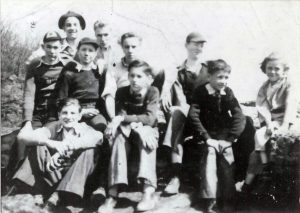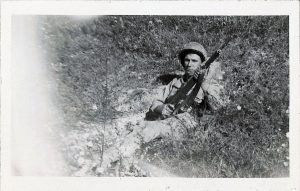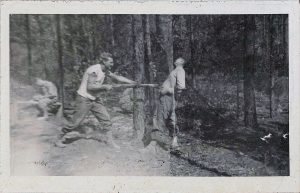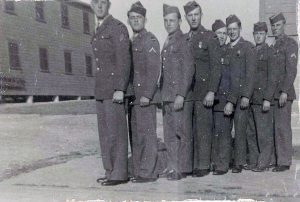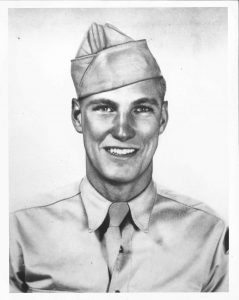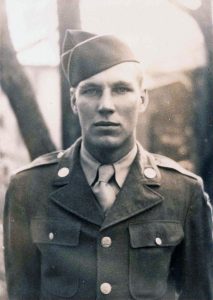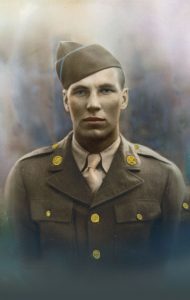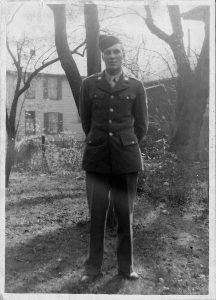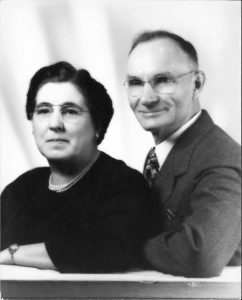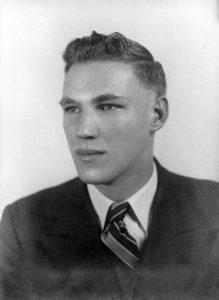- Home
- Biography
- Medal of Honor
- Honors
- Ed Kelley Memorial Plaza
- J. Edward Kelley Society
- Jonah E. Kelley Army Reserve Center
- Jonah E. Kelley Memorial Bridge
- Jonah Edward Kelley Day
- Kelley Barracks, US Army Base
- Kelley National Guard Armory
- Medal of Honor Book
- Medal of Honor Grove
- USAT Sgt. Jonah E. Kelley
- USNS Sgt. Jonah E. Kelley
- 78th Lightning Division Memorial
- Ed’s Journey to WWII
- Galleries
- Family
- Contact
Jonah Edward Kelley
Medal of Honor Recipient
Full Biography
Jonah Edward “Eddie” Kelley
More than 10 million U.S. soldiers served in World War II, and only 292 Medals of Honor were awarded; 130 of them were given posthumously. Jonah Edward “Ed” Kelley was one of the 130 who gave his life for his country in such circumstances that he was awarded America’s highest decoration for valor.
Kelley was born April 13, 1923, in Rada, W.Va., and his family moved to Keyser, W.Va., in 1927, when his father got a job with the West Virginia Pulp and Page Mill. Ed lived in Keyser until he joined the Army in 1943. It was a good place to live during the Depression; only one bank closed, the grocery stores gave credit and teachers’ salaries were only missed for one month, which was later paid retroactively. WPA projects paved Main Street and other avenues and put in a sewer system.
Times were hard in the 1930s, and the family was forced to move several times. In 1937, they moved in with his grandmother, but they had to move out the next year because she had to rent her extra rooms to boarders to make ends meet. Ed was a Boy Scout, known for his honesty, a leader in the local Methodist Youth Fellowship and played football in high school. In many ways, his youth was typical of the young men from the South who served in World War II.
Ed graduated from high school in 1941 and attended Potomac State Junior College in the fall. But he didn’t enroll for the second year. Learning that he was about to be drafted, he tried to join the Marines but was rejected. He decided to join the Army. Ed reported for duty March 16, 1943, and was sent to Camp Butner near Durham, N.C., for basic training with the newly formed 78th “Lightning” Division, under the command of Maj. Gen. Edwin Parker. In basic training, he earned both the expert rifleman and expert BAR marksmanship medals and was assigned to the 311th Infantry Regiment.
A natural leader, Ed was promoted to sergeant by the time the division left Camp Butner and was selected to be part of the training cadre during the division’s advanced training at Camp Pickett. He was promoted to staff sergeant just before his unit embarked on the Carnarvon Castle, a converted British liner built in 1926. The 78th Division arrived in Southampton on Oct. 25, 1944, and the soldiers were quartered in hotels and private homes in Bournemouth, an English seacoast resort, while they trained on the beaches. The division finally crossed the English Channel on Nov. 17, 1944.
The 78th Division finally reached the front lines in Belgium on Dec. 9, 1944, and Ed’s regiment, the 311th, was attached to the 8th Division as it moved into the Huertgen Forest in what was called the Monschau Corridor. Their objective was the Roer River dams. The fighting was intense as the 78th Division covered the flank of the 8th Division and eventually relieved it. The divisions advanced on the first day of combat but suffered 238 casualties. The offensive stalled because of the German attack to the south in the Ardennes (the Battle of the Bulge), starting on Dec. 16 and ending in mid-January.
By Jan. 30, the 78th Division had advanced to a German strongpoint at Kesternich, where the fighting was house to house. Kelley’s squad spearheaded the attack against a series of barricaded houses. Twice wounded by mortar fire, he refused to be evacuated and continued to lead his squad forward. Pulling the pins from grenades with his teeth (his left hand had been wounded), and throwing them into the enemy positions, he reached one house, killed three Germans and cleared the way for his squad to go forward. Killing a sniper and another German soldier running from a cellar, he enabled his squad to secure part of the town.
Despite his wounds he organized his squad into a strong defensive position as it became dark. The next morning, he continued to head his squad forward. Coming under heavy machine gun fire, Kelley ordered his men to remain behind and single-handedly attacked the enemy position. Although he was shot several times, he silenced the machine gun nest before he died. He was awarded the Medal of Honor for his actions.
[clear]

